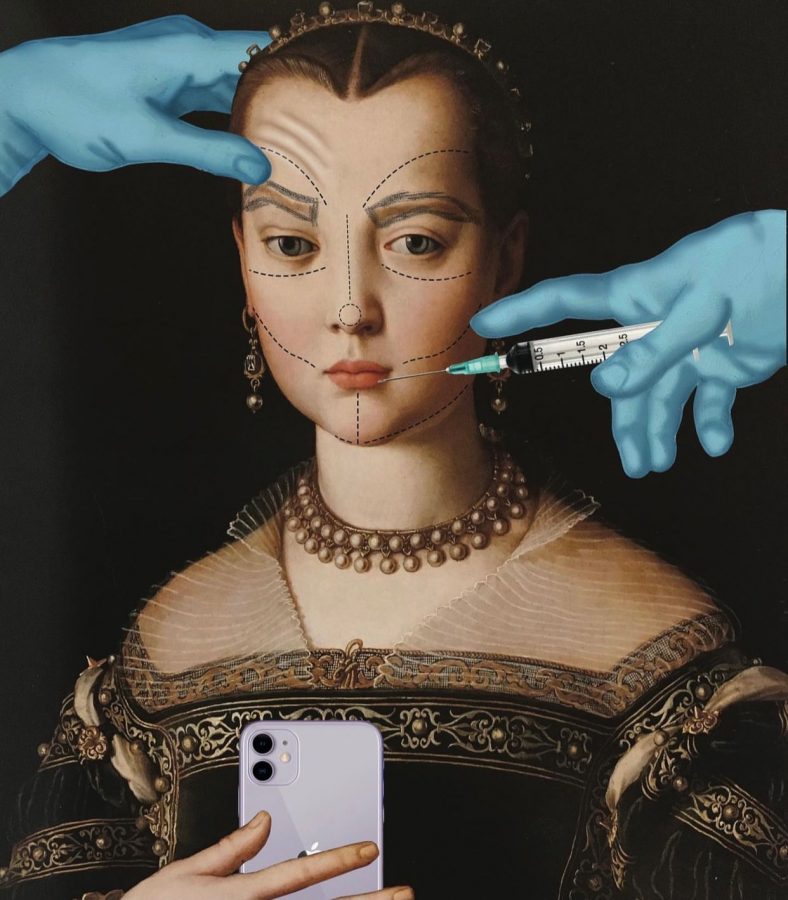How do I look?: Social media and body standards
Social media should be fun not detrimental to your health.
September 23, 2021
Social media has drastically changed body image standards amongst Gen Z users. Dieting and plastic surgery are considered vital to compete with the celebrities and influencers who take part in promoting or creating ideals of “perfection.”
Shows like “Botched,” “Revenge Body with Khloe Kardashian,” and “America’s Next Top Model,” are derived from keeping up with appearances. This trend is not only centered in the U.S. Plastic surgery and aesthetic enhancements are significant contributors to the economies of countries such as Brazil and Mexico as well.
Senior Kat Herzlinger, a member of the sorority Gamma Lambda Rho and a profound mental health advocate, stresses the importance of stable eating habits given the extreme dieting cultures that surround us on social media.
“With the way societal body standards change, it’s unhealthy and impossible to keep your body in style,” said Herzlinger. “Your body is your temple and you need to nourish it and take care of it regardless of what you think people think you look like.”
It is true that women are more likely to feel pressured to look or behave a certain way, while men often fly under the radar when it comes to their social media persona; rarely are their bodies or fashion criticized. For example, at the recent Met Gala and VMAs, the media more seriously emphasized women’s wear.
Nonetheless, there are still pressures men undergo on social media, given that hyper-masculine standards still exist.
Senior Joey Lopez, majoring in marketing and entrepreneurship, is an avid social media user. He wants to maximize the opportunities media platforms provide, personally and professionally. Authenticity seems to imprint on others, not subscribing to trending looks, ideas and personalities seen on celebrities/influencers.
“Since social media users pick and choose what they want to share, the reality of their lives may look ‘ideal’ or ‘better’ to the other users,” said Lopez. “In doing this, social media creates a false sense of reality and more importantly, the comparison of one’s life to that reality, creating high standards and low self-confidence.”
Lopez encourages new users and those who intend on expanding their viewership and following to know their intended audience and maintain maturity especially when handling negativity.
“Social media is a great tool to stay connected to friends and family, but there needs to be a set of rules and a period of self-development before an individual should create an account,” said Lopez.
Sophomore Katia Honliasso, saturates her Instagram feed with eye-catching colors. Most of her popular photo-ops of her outfits are taken throughout Iona’s campus.
Expressing herself through her clothing is limitless, so Honliasso spends thirty minutes every morning designing her outfit of the day, or OOTD.
“I say there is no ideal body type,” said Honliasso. “You are created in a unique way and it is up to you to not follow social media but follow your heart and the love you have for you.”
Honliasso believes that even those who represent perfection also face insecurities. The difference is that they can either skillfully conceal their imperfections or can afford alterations.
“For those wanting the perfect body – there isn’t one,” said Honliasso. “It’s all about having confidence in yourself and expressing it. We all have an issue that we’re dealing with.”
It’s important to note that social media personnel are not directly responsible for anyone’s insecurities. They don’t force their audience to conform to what’s popular or to attract a partner. They too sometimes cannot help if they embody what’s trending. At the end of the day, no one should change how they look to please someone else.
Although inclusivity has reached young adults, this is only blanketing the negativity social media has already imposed. Appreciating the beauty of others without reflecting on oneself is easier said than done.




